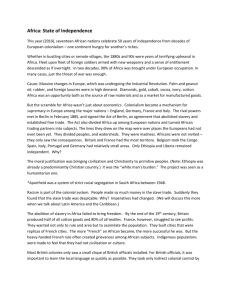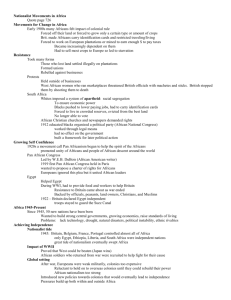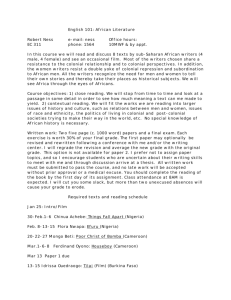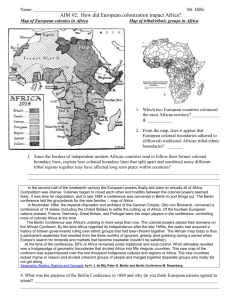World War I and Africa: Introduction
advertisement
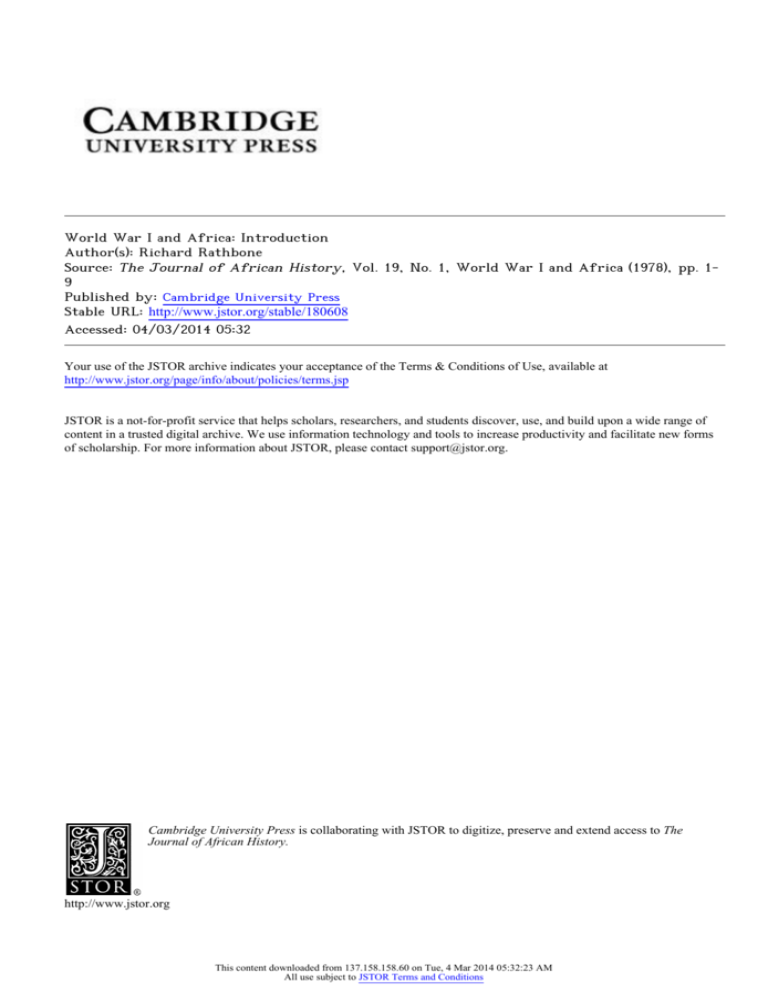
World War I and Africa: Introduction Author(s): Richard Rathbone Source: The Journal of African History, Vol. 19, No. 1, World War I and Africa (1978), pp. 19 Published by: Cambridge University Press Stable URL: http://www.jstor.org/stable/180608 . Accessed: 04/03/2014 05:32 Your use of the JSTOR archive indicates your acceptance of the Terms & Conditions of Use, available at . http://www.jstor.org/page/info/about/policies/terms.jsp . JSTOR is a not-for-profit service that helps scholars, researchers, and students discover, use, and build upon a wide range of content in a trusted digital archive. We use information technology and tools to increase productivity and facilitate new forms of scholarship. For more information about JSTOR, please contact support@jstor.org. . Cambridge University Press is collaborating with JSTOR to digitize, preserve and extend access to The Journal of African History. http://www.jstor.org This content downloaded from 137.158.158.60 on Tue, 4 Mar 2014 05:32:23 AM All use subject to JSTOR Terms and Conditions Journal of African History, XIX, I (1978), pp. I-9 Printed in Great Britain WORLD WAR I AND AFRICA: INTRODUCTION BY RICHARD RATHBONE THE study of the history of Africa during World War I raises two major problems of synthesis and a host of smaller problems. First of all, the sheer diversity of the continent and the extremely uneven nature of its precolonial development,1 let alone the patchy and differentiated modes of imperial and colonial penetration, make it difficult to see its experience, even of so ostensibly cataclysmic an event as World War I, as a unified whole. Indeed, the diversity of the continent was mirrored in the diversity of its experience of the war, which combined the actual agony of the battlefield for many thousands of black troops both in Africa and in Europe at one extreme, with the undoubted uneventfulness of those same years for many others. Secondly, there is a problem of periodization. Unlike World War II, World War I does not mark a turning point in anything like so clear a fashion. Whereas after World War II it is surely true that 'nothing was ever the same', the lines between cause and effect before and after World War I are far from neatly drawn, and not merely because less is known about the period as a whole. Apart from the directly obvious changes in Africa consequent upon the war itself, such as the East African campaign, the transfer of the German colonial possessions under the League of Nations mandate after the War, the recruitment of Africans and the emphasis on 'war production', the key question of cause and effect, of whether what we observe after the war came because of the war, remains hazy in the minds of historians. It was this, above all, that prompted the selection of this theme-'The impact of World War I on Africa'-for a two-day conference held at the School of Oriental and African Studies, London, in i977, at which the papers in this issue of this Journal were first presented. The conference, naturally, solved few of the problems but it did draw attention to some major themes which ran through many of the papers and which, it is hoped, will provide others with ideas for future research. Before attempting to tease out some of these, it is important to note the areas of darkness. We learnt little about colonial policy in war-time and little about the economic history of Africa between 19I4 and I918. If anything we were left with a general impression that the problems of communication during the period, coupled with the grander preoccupations of metropolitan governments, led to a period of almost maximal local, pro-consular initiative with minimal metropolitan inter1 Under which head I include factor-endowment, demography, the spread of precolonial cash production, etc. This content downloaded from 137.158.158.60 on Tue, 4 Mar 2014 05:32:23 AM All use subject to JSTOR Terms and Conditions RICHARD 2 RATHBONE ference. To some extent it is clear that local colonial authorities used the war in Europe as a convenient smoke-screen behind which they could pursue cherished goals unhindered. Lugard, for example, seems to have been behaving thus in rushing through the Provincial Court, Supreme Court and Criminal Procedure Bills in Nigeria in the two months following the outbreak of European hostilities. World War I was certainly a smokescreen which blinded both metropolitan critics of colonialism and, as one could see in many of the conference papers, many of the African modern elite whose 'loyalty' and 'goodwill' towards the metropoles appears to have been relatively general. These generalities aside, it is important to recapture the marginality of Africa in overall imperial war strategy, particularly in the case of Britain. Although it looms large in our consciousness, and was to figure prominently in metropolitan concern in the inter-war period, a dogged hunt through the numerous memoirs of the period reveals that those in high places thought little about the 'colonies' and even less about Africa at the time. Empire meant pre-eminently the 'white Dominions' and India; throughout I914-I8, Africa was reserved, as on pre-war agendas, for 'any other business'. This is a rude discovery for an Africanist, but the very transformation of that situation, the growth of the perceived need to be better informed, instanced by the burgeoning committees of experts working for the Colonial Office in the inter-war years, owed a great deal to the alteration in circumstances in metropolitan-African relations following World War I. A substantial degree of this transformation can, in the case of Britain, be seen in economic terms. In I9I3, for example, only about 22 per cent of all United Kingdom exports had Imperial (including African) destinations; by 1938 that percentage had doubled. Of those figures, of course, both India and the 'white Dominions' enjoyed the lion's share and Africa accounted for only a minute proportion of such flows. A non-economist cannot satisfactorily account for such changes and the secondary literature seems still to be debating them. Imperial markets obviously become more important relative to non-Imperial markets after 1918. And part of the reason for this lies within the metropole itself. British goods found it harder to compete within the markets of the industrialized world after 1918; Britain's industrial efficiency had not kept abreast with the strides made in German and North American industry, for example. Moreover, after 1918 the industrialized world played a rougher and tougher game, first using tariffs and later even more direct methods.2 In import terms, Britain's imperial dependence increased dramatically after I9I8. In I913 something like 80 per cent of British imports derived from non-imperial sources. By 1938 that percentage had been reduced to about 60 per cent.3 In sum, it seems that the Empire as a whole began to make a dramatic 2 See A. R. Hall (ed.), The Export of Capital from Britain (London, I968). See Ian Drummond (ed.), British Economic Policy and the Empire, I9g9-39 1972). 3 This content downloaded from 137.158.158.60 on Tue, 4 Mar 2014 05:32:23 AM All use subject to JSTOR Terms and Conditions (London, WORLD WAR I AND AFRICA 3 'contribution' as a supplier and as a market in the inter-war period. Part of the explanation for this, and much of the explanation for the far greater concern with colonial matters after the War, lies in the extensive 'sharing' Britain enjoyed in the relative domestic prosperity achieved in the Empire after I918. In many areas of the colonial world, then, considerable economic expansion occurred between the wars and it seems likely that Africans were highly significant in the process, though the precise size and nature of their contribution remains a subject for further research. Capital investment and exports appear to have risen, with a grinding interlude during the Depression; even in those parts of Africa where Britain enjoyed no tariff preference, Britain 'shared' the market response of Africans, the growth of local markets and the creation of wealth. It is clear from many of the conference papers, and from discussion they provoked, that this expansion was closely related to the War itself. First, the war-time measures of the metropoles included an intensification of the production drive in cash-crops and minerals. This in turn was reinforced by the clear relationship between military recruitment and labour recruitment. It is evident that the extent of social and political control over Africans was increased under war-time conditions, accelerating processes of change implicit in the introduction and encouragement of new modes of production before I914. Before I9I4 Africa was for the most part a dream for the greedy speculator. From 1918 it seems likely that her role was more centrally related, or at least perceived to be more centrally related, as part of the empire, to the very heart of the metropolitan economies themselves. By I914, although the metropoles were inescapably imperial powers in Africa, the shape of that colonial domination was by no means set. In Britain the contest between those loosely described as liberals and Imperialists as to that shape was not completely ended. It is a contest complicated by the political crises of the first decade of the twentieth century. But it is tempting to see the I914-I8 War as a period in which the liberal conscience abdicated in favour of more imperially minded figures like Curzon, Milner and, even more importantly for the future of southern Africa, Jan Smuts, all of whom served in the War Cabinets. But that abdication pre-dates I9I4 in many respects. Dilke was clear, for example, about the escape and evasion exercise that had ensued in the House of Commons debate on the South African Union Bill.4 While he and others may have striven for what they perceived as the preservation of African interests, the resolution of the white war in South Africa involved voltes faces and retractions which left the critiques of colonialism in less and less well-placed hands well before I9I4. But as Sir Keith Hancock has shown5 the Rhodes-Chamberlain ideal of a protectionist imperialism gained ground amongst Conservatives through the course of World War I. 4 House of Commons, Debates, 4H I88.I3 :V:I9o8.I229. 5 Survey of British Commonwealth Affairs, 1918-39. Vol. II Problems of Economic Policy (London, 1942), Part I, 94-IIo. This content downloaded from 137.158.158.60 on Tue, 4 Mar 2014 05:32:23 AM All use subject to JSTOR Terms and Conditions 4 RICHARD RATHBONE At the other extreme, as Professor P. S. Gupta explains,6 the British Labour movement was confused on colonial matters. But I914-18 were crucial years in that throughout Europe they were not years of debate and theory, but rather years of practice, a time of shortterm actions rather than long-term planning. Opponents of colonialism were in a trap they themselves perceived. War was inseparable from imperialism, and Empire. To oppose war was to be unpatriotic, and patriotism and Empire became more and more synonymous. This closing of ranks, the take-over of the commanding heights by imperially minded statesmen, and, no less importantly, civil servants and diplomats, in some senses completed colonialism in fundamental fashion. In the circumstances it seems odd that some historians persist in calling World War I a 'European War'. Lloyd George himself concluded that 'it is not one continent that is engaged-every continent is affected'.7 As he admitted to Colonel House, it was an imperialist war.8 Securing German colonies, for example, was amongst allied war aims. No power was capable of significantly altering the victors' chosen paths. Although a fair amount of attention has focused on American influence in the imperial sphere, particularly over the initiation of the mandates system,9 that influence seems to have been severely limited. More significant in the long term, perhaps, was the early appreciation and exploitation of the Allied shipping shortage during 1914-18, when American freighters became more and more regular callers at West African ports. Although W. H. Page, the American Ambassador in Britain, wondered whether the imminent collapse of 'this England and Empire' would 'put the leadership of the race in our hands'0 his musing was thirty years premature. Fundamentally World War I seems to have accelerated the process of political and economic change in colonial Africa. It was a period in which a largely haphazard colonial world became an increasingly centralized affair. The widening scale of the African empires both in terms of space and, more importantly, of economic, political and social penetration forced a radical change in the 'style' of colonialism, and all the contributions to this conference seem to have been agreed upon this point. In many ways the War marked the period in which 'pacification' of both African and metropolitan critics of colonialism ends and colonial rule proper begins. This is perhaps rather a negative standpoint. One can assuredly set against it Harry Johnston's trenchant comments to the African Society in March I9I9. World War I, he argued, had seen the 'beginning of revolt 6 Partha S. Gupta, Imperialism and the British Labour Movement I914-I964 (London, 1975), cap. 2. 7 War Memoirs, vol. II (London, 1938), I355. 8 C. Seymour (ed.), The papers of Colonel House (London, 1926), vol. III, p. 240. ' See, e.g., Gaddis Smith, 'The British government and the disposition of the German colonies in Africa', in P. Gifford and W. R. Louis (eds.), Britain and Germany in Africa (Yale, I967) and W. R. Louis, 'The United States and the African peace settlement of 1919', J. Afr. Hist., IV, 3, 4I3-34. 10B. Hendrick, Life and letters of W. H. Page (London, I923), vol. I, p. I74. This content downloaded from 137.158.158.60 on Tue, 4 Mar 2014 05:32:23 AM All use subject to JSTOR Terms and Conditions WORLD WAR I AND AFRICA 5 against the white man's supremacy'. If he had been as well informed by nearly sixty years of ensuing African studies he would have found ample evidence for his polemical assertion. The period had seen innumerable cases of opposition to European rule, from outright resistance-the Kwale Ibo or the Egba rising of June 1918, for example-to the newer and more subtle forms of hostility evidenced by the clear signs of crop retention by Gold Coast cocoa farmers in reaction to low cocoa prices. But the role of the War itself as either an immediate case of new social movements or as a period in which the form of social movements radically changes was hotly debated at the conference. And, in general, the tentative conclusion again was that continuity and discontinuity were finely balanced. In line with perhaps the most important shift in African historiography in the past twenty years, the conference papers bore strikingly upon the absolute importance of focusing on all African social groupings, and not merely the 'westernized elite', whose relative passivity in this period conceals the ferment in the rest of the society as Killingray shows for the Gold Coast. The period is one of striking contrasts. It is apparent that Africans were being presented in their everyday life with an infinitely more intensive and sometimes brutal form of repression than they had experienced in the early years of colonial rule. The French West African recruiting drive of I9I5-I6 clearly deserves its awful reputation for harshness. As Ann Summers and R. W. Johnson show, few of its recruits were volunteers in any of the accepted senses of that word, and the methods employed in impressing men both by administrative officers and chiefs rank alongside some of the worst horror stories of the epoch. Similarly, as Cross sought to emphasize in a paper on social movements during and after the war, examples abound throughout Africa of arbitrary and uncompensated crop requisitioning, and cavalier treatment (to put it mildly) of entire areas with the misfortune to be cast as war zones. Robert Archer's interesting paper on Madagascar rebutted the 'inevitability' of all this. His account singularly lacked the oppressive thread of both the West and East African stories. (Unfortunately both these last papers have had to be omitted from the collection of papers published here for reasons of space). It is at any rate clear that the economic impact of the War on southern Africa was a great deal more equivocal than Katzenellenbogen has acknowledged; increased demand for strategic minerals, for example, did not necessarily 'drive up' wages, for as Charles Perrings has shown recently in the case of Katanga, the response to labour 'shortage' might simply be to tighten the screws on African villagers.1l Many of the papers presented to the conference contributed to the erosion of simplistic views of change in Africa. However frightful many of 11S. E. Katzenellenbogen, 'Southern Africa and the War of 19I4-18', in M. R. D. Foot (ed.), War and Society (London, 1973), 107-22; C. Perrings, '"Good lawyers but Poor Workers": Recruited Angolan Labour in the Copper Mines of Katanga, I9I7-21,' J. Afr. Hist. xvIII, 2 (I977), 237-59. This content downloaded from 137.158.158.60 on Tue, 4 Mar 2014 05:32:23 AM All use subject to JSTOR Terms and Conditions 6 RICHARD RATHBONE the induced changes occasioned by the War were, African society had by no means lost all of the initiative. African society was not being simply crushed. Cross's paper was wisely insistent upon this; Archer's paper stressed the continuity in Madagascar in this period. Paradoxically, as Summers and Johnson show, the crushing pressure of conscription in Guinea actually appears in some cases to have frozen the status quo ante bellum and even to have restored the power of chiefs who had been under severe French pressure in the years before I9I4. Part of the explanation of this must lie in a theme which appeared marginally in a number of the papers, but which needs to be more fully explored. This period of rapid change occurred at a time of significantly lower administrative and commercial white staff-numbers in almost all colonial states. The percentage of white administrators and commerPants to total populations fell throughout Africa throughout I9I4-I8, as it was to do during the Depression and again in I939-45, as the priorities of great matters in Europe lured them away. Thus the deeper and ultimately most pervasive penetration of the fabric of African life occurred when there were fewer visible 'colonialists' upon the ground. In South Africa, both African and Afrikaner were to benefit from the absence of English-speaking workers on the front-though the former were only to do so temporarily. Elsewhere, one of the results of this was the simple substitution of blacks in roles previously earmarked for whites, which in turn goes some little distance towards explaining elite quiescence. But the very staff shortages signalized a crisis of considerable dimensions both for colonial powers and for commercial concerns. For both, the shortterm solutions were to prove to be of long-term significance. To put it at its simplest level, there was a clear fusion of these two spheres. Government was to play a greater role in the economies, in the forms of controls and intervention in general, and business, as Killingray shows for the Gold Coast, was to play a greater role in government as adviser and as lobby. Colonial authority was digging itself in, an inevitable consequence of the demands for conscripted troops and labour, the general increase in taxation and the rising demands being made upon rural producers. But it was doing so in a period of weakness. Killingray cites Clifford's fears about the 'Combine's' near monopoly, but the Gold Coast's revenues depended vitally upon the unencumbered activity of firms taking full advantage of the death of laissez-faire. In more simple form, colonial governments were also bound to respect the local equivalents of Chambers of Mines and Chambers of Commerce who were 'doing their bit' in terms of producing the materials the Empire Resources Development Committee demanded. It was not only this leverage that increased the power of European business. The growth of European oligopolistic enterprise, or at least oligopolistic aspirations, certainly antedates I914. But World War I greatly facilitated its success. First, and not unimportantly, the War re- This content downloaded from 137.158.158.60 on Tue, 4 Mar 2014 05:32:23 AM All use subject to JSTOR Terms and Conditions WORLD WAR I AND AFRICA 7 moved Germany from its powerful trading position in Africa. French and particularly British enterprise was greatly encouraged by the elimination of major competition. As is well known, German commercial houses before I914 dominated not only their own colonial trade but played a very large part in the trade of French and British colonies as well. That windfall accelerated trends already in train. The war certainly stimulated, sometimes in crude fashion, African production. But to conclude from the figures that prosperity resulted goes too far. Despite the appearance of a boom in most sectors between 1915 and 1917, the external trade of most African colonies in real terms was depressed. Despite the complexities of the situation, there are grounds for hazarding that World War I rehearsed the mode by which African entrepreneurs and rural producers were to be out-gunned during World War II by the European competitors. Between I914 and I9I8, as between 1939 and I945, severe shipping shortages created bottlenecks which adversely affected African business to the gain of European concerns who through their closeness to Government had more access to shipping space. In West Africa it can be clearly seen how the West African Shipping Conference, which of course had linkages with British commercial concerns, kept non-British concerns out of trade by its virtual monopoly of freight space. It also, logically from its own point of view, blocked African access to shipping for both import and export purposes. This occurred, as it did in 1939-45, when commercially minded Africans knew that they could have benefited from the considerable profits accruing from the common practice of 'marking-up' prices of imported goods at a time of their relative shortage. European commerce reaped a rich reward partly because producer prices were being kept down by the state while no matching controls were placed upon retail prices. Other institutions reinforced this tendency. Certainly the reputation of the banking sector for prejudice in the granting of credit owed something to the particularly tight controls placed upon Banks in war-time. But there is little doubt that the favouring of 'old' customers, more particularly firms in which they had large stakes, blocked Africans in a further way. The significance of inflation in provoking African discontent during and after World War II has received more attention than that of inflation between 1914 and 1920, which appears to have been no less important. Although the figures are confusing, it appears that the amount of money in circulation increased in British African colonies by about 500 per cent between I913 and 1918. Because of the short supply of import goods, the cost of these rose enormously. In addition it appears that many areas also saw great increases in food prices, not least because of shortages occasioned by the removal of labour from food cultivation through conscription and the diversion of food cultivators into non-edible cash crops. In much of Africa by 1914, many imported goods were no longer classifiable as luxuries. Kerosene, cloth, matches, matchets and many other western industrial This content downloaded from 137.158.158.60 on Tue, 4 Mar 2014 05:32:23 AM All use subject to JSTOR Terms and Conditions 8 RICHARD RATHBONE products were part of African everyday life. Thus the overall situation of real decline in prices paid for export crops was mirrored in the high cost of imported goods and probably locally produced goods as well. The financial implications of war for most colonies worsened this situation and underlines the governmental role in circumscribing African opportunity. In many colonies the war increased taxation and decreased development expenditure. Some colonies like the Gold Coast or Kenya actually funded colonial war, the bill for the invasion of Togoland being ?6o,ooo. In addition, most colonial governments voted sums as war 'contributions' to metropolitan governments. To meet these bills taxation was increased and services declined, not least because the low energy of colonial economies made revenue hard to raise in other fashions. This did not stop colonial governments increasing specific duties on a number of significant imports, sometimes by several hundred percent. At the same time, public sector capital expenditure in most colonies, which in any case was very modest before I9I4, fell by as much as a third between 1914 and I918 in money terms and in real terms of course a great deal more dramatically. Africans paid a heavy price for maintaining the colonial governance of their countries in war-time. And when the burden appeared to fall on expatriate companies, as it appears to do in the raising of revenue through, for example, cocoa export duty, it is clear that the burden of this was shifted onto the farmers by price-lowering. The press of war-time measures, from labour-recruitment through price manipulation for producers and the obstruction of African traders, affected all levels of colonial society. They gave the previous abstraction of the 'colonial state' a thoroughly concrete reality. Africans did not of course simply lie down under this onslaught. In many respects their reactions were remarkable for their doggedness. Beyond the sphere of open revolt lay powerful attempts to outflank European encroachment. Africans, as Killingray shows, adopted subtle methods to evade the European shipping and banking lock-outs. Cash farmers went on buying land throughout the war in many areas despite the drop in world prices. On the eve of the lorry revolution the optimistic maximizers are to be found energetically building their own roads and their own bridges, usually without central revenue support and frequently voluntarily. Similarly, I914-18 seems to have heralded a vast increase in demand for western education. Most African colonies had many more schools in I9I8 than they had in I9I4. Both in West Africa and, as Louise Pirouet shows, in East Africa, schools and missions were most certainly the product of African demand, and some were financed and run by Africans. To this more positive picture must be added the role of the ex-servicemen, some of whom do appear to have been significant 'modernizers'. They also appear to have been an importantly disappointed group whose inducements to serve were seldom honoured. Their political consciousness was to be significant in the history of nationalism in the following three decades. This content downloaded from 137.158.158.60 on Tue, 4 Mar 2014 05:32:23 AM All use subject to JSTOR Terms and Conditions WORLD WAR I AND AFRICA 9 This rather more positive and redressive picture needs to be set beside a somewhat more equivocal penetration of Africa by survey. Physically Africa was more exhaustively surveyed for its mineral and other wealth than ever before. Some of the most notable mineralogical surveys date from this period, such as Major Kitson's famous Gold Coast survey which inter alia resulted in the discovery of and immediate exploitation of its bauxite reserves. Agricultural research was similarly energetically pursued, particularly where it could be followed up with development based upon war requirements: hence a widespread devotion to rubber and oil production. But African society no less than African topography was also under the microscope. Systematic official, as opposed to missionary, research into language and society seems to have its origins in this period. While one is in the debt of the Rattrays and the Cardinalls, the process of increasing information carried with it the essential message of the permanent nature of colonial rule. It seems clear that the War itself, and its direct consequences, were of enormous significance to Africa. The conference by no means tied up all the loose ends. Strikingly absent in terms of systematic treatment was, for example, the influenza epidemic of I919-20, which Kuczynski himself is vague about. It does seem likely on his figures, and others, that mortality of the order of 5 per cent was common. It is an odd comment on our priorities that we know more about cattle epidemics than we do about human disasters. In conclusion it seems clear that the period of World War I is not a Eurocentric time capsule which we artificially introduced into the African context. The War was very much a reality for Africa, a period of immense and significant change of which we have only just scratched the surface. This content downloaded from 137.158.158.60 on Tue, 4 Mar 2014 05:32:23 AM All use subject to JSTOR Terms and Conditions


